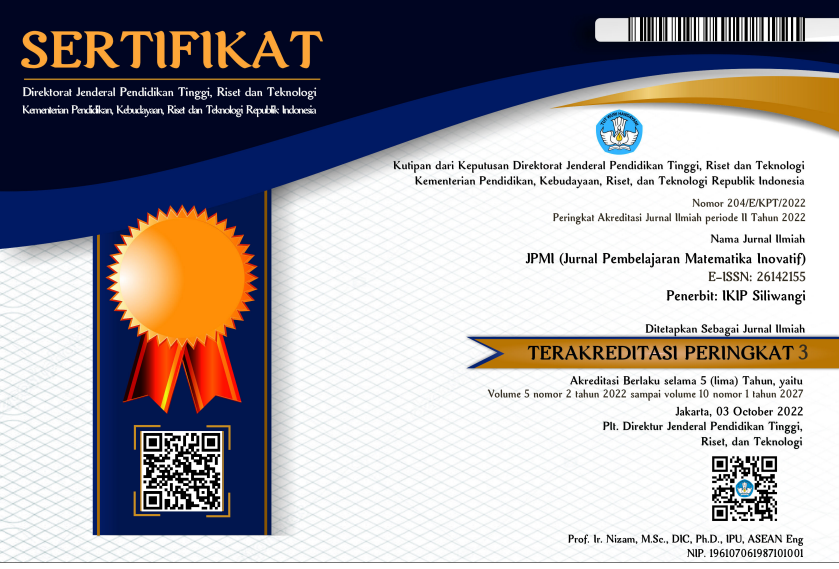Efektivitas pendekatan Problem Based Learning (PBL) dalam peningkatan kemampuan berpikir kritis matematis siswa SMP pada materi perbandingan
DOI:
https://doi.org/10.22460/jpmi.v7i4.24982Keywords:
Mathematical Critical Thinking, Ratio Topic, Problem Based LearningAbstract
This study aims to assess the effectiveness of the Problem Based Learning (PBL) approach in enhancing junior high school students' mathematical critical thinking skills on the topic of ratios. The subjects of the study were students from SMP IT Nur Al Rahman Cihanjuang, divided into two classes. One class, comprising 21 students, served as the experimental group and received instruction through the Problem Based Learning (PBL) approach, while the other class, also consisting of 21 students, served as the control group and received conventional instruction. The instruments used included interview sheets, documentation studies, student response questionnaires, observation sheets, and a test of mathematical critical thinking skills with 5 essay questions. The data obtained from the pretest and posttest were analyzed using inferential and descriptive statistics. The study's findings indicated that the Problem Based Learning (PBL) approach was more effective in improving the mathematical critical thinking skills of junior high school students on the topic of ratios compared to conventional teaching methods. Consequently, there was an improvement in the mathematical critical thinking skills of students using the PBL approach compared to those using conventional teaching methods.
References
(OECD), T. O. for E. C. and D. (2023). Program for International Student (PISA) 2022 assessment and analytical framework. https://www.oecd-ilibrary.org/education/pisa-2022-assessment-and-analytical-framework_dfe0bf9c-en
Agnesti, Y., & Amelia, R. (2020a). Analisis kesalahan siswa kesalahan VIII SMP di kabupaten Bandung Barat dalam menyelesaikan soal cerita pada materi perbandingan ditinjau dari gender. Jurnal Cendekia : Jurnal Pendidikan Matematika, 4(1), 151–162. https://doi.org/10.31004/cendekia.v4i1.186
Agnesti, Y., & Amelia, R. (2020b). Penerapan pendekatan kontekstual dalam menyelesaikan soal cerita pada materi perbandingan dan skala terhadap siswa SMP. Mosharafa: Jurnal Pendidikan Matematika, 9(2), 347–358. https://doi.org/10.31980/mosharafa.v9i2.748
Annisa, D. (2022). Jurnal pendidikan dan konseling. Jurnal Pendidikan Dan Konseling, 4(1980), 1349–1358.
Apriliani, Y., Arif, M. N., Sutriyani, W., & Wakit, A. (2023). Effectiveness of problem based learning model assisted with padi (board diagrams) media on mathematics learning outcomes. 2(September), 172–179.
Dwi, R., & Puspita, R. (2020). Korelasi kemampuan berpikir kritis dan kreatif matematis kemampuan pemecahan masalah matematis materi bangun ruang dengan. 3(2), 96–103.
Elyana, D., Wulandari, A. A., & Mulyani, O. B. T. (2022). peningkatan prestasi belajar matematika siswa dalam pembelajaran jarak jauh berbasis video. Plusminus: Jurnal Pendidikan Matematika, 2(1), 77–86. https://doi.org/10.31980/plusminus.v2i1.1540
Febrita, I., & Harni. (2020). Penerapan pendekatan problem based learning dalam pembelajaran tematik terpadu di kelas IV SD. Jurnal Pendidikan Tambusai, 4(2), 1435. https://www.jptam.org/index.php/jptam/article/view/608
Hikmah, N. (2022). Analisis kemampuan berpikir kritis matematis pada materi pecahan. Sepren, 4(01), 88–94. https://doi.org/10.36655/sepren.v4i01.849
Madang, K., Arifin, Z., Santoso, L. M., Nazip, K., Destiansari, E., & Anggraini, N. (2022). Pelatihan Teknik pembelajaran flip classroom instruction menggunakan pendekatan problem based learning bagi guru-guru ipa kota palembang. Dharma Raflesia : Jurnal Ilmiah Pengembangan Dan Penerapan IPTEKS, 20(1), 24–37. https://doi.org/10.33369/dr.v20i1.19259
Prihono, E. W., & Khasanah, F. (2020). Pengaruh model problem based learning terhadap kemampuan berpikir kritis matematis siswa kelas VIII SMP. EDU-MAT: Jurnal Pendidikan Matematika, 8(1), 74–87. https://doi.org/10.20527/edumat.v8i1.7078
Purba, G. F. (2022). Implementasi Pendekatan pendidikan matematika realistik indonesia (PMRI) pada konsep merdeka belajar. Sepren, 4(01), 23–33. https://doi.org/10.36655/sepren.v4i01.732
Ratnawati, D., Handayani, I., & Hadi, W. (2020). Pengaruh model pembelajaran pbl berbantu question card terhadap kemampuan berpikir kritis matematis siswa SMP. Edumatica : Jurnal Pendidikan Matematika, 10(01), 44–51. https://doi.org/10.22437/edumatica.v10i01.7683
Sanga, L. D., & Wangdra, Y. (2023). Pendidikan Adalah faktor penentu daya saing bangsa. Prosiding Seminar Nasional Ilmu Sosial Dan Teknologi (SNISTEK), 5(September), 84–90. https://doi.org/10.33884/psnistek.v5i.8067
Sappaile, N. (2019). Hubungan pemahaman konsep perbandingan dengan hasil belajar kimia materi stoikiometri. Jurnal Ilmu Pendidikan STKIP Kusuma Negara, 10(2), 58–71.
Witanta, V. A., Baiduri, B., & Inganah, S. (2019). Pengembangan komik sebagai media pembelajaran matematikapada materi perbandingan kelas VII SMP. Lentera Sriwijaya : Jurnal Ilmiah Pendidikan Matematika, 1(1), 1–12. https://doi.org/10.36706/jls.v1i1.9565
Wulandari, A., & Hasibuan, L. R. (2023). Pengaruh model pembelajaran STAD dengan bantuan media geogebra terhadap hasil belajar matematika siswa SMP. JPMI (Jurnal Pembelajaran Matematika Inovatif), 6(2), 641–650. https://doi.org/10.22460/jpmi.v6i2.16264
Yasinta, P., Meirista, E., & Rahman Taufik, A. (2020). Studi Literatur: Peningkatan kemampuan berpikir kritis matematis siswa melalui pendekatan contextual teaching and learning (Ctl). Asimtot : Jurnal Kependidikan Matematika, 2(2), 129–138. https://doi.org/10.30822/asimtot.v2i2.769
Zuwariyah, S., Irawan, E., & Artikel, I. (2021). Pengaruh model sains teknologi masyarakat dan pendekatan ESD dalam meningkatkan kepedulian lingkungan, Jurnal Tadris IPA Indonesia, 1(1), 68–72.
Downloads
Published
Issue
Section
License

This work is licensed under a Creative Commons Attribution-ShareAlike 4.0 International License.
The author is responsible for acquiring the permission(s) to reproduce any copyrighted figures, tables, data, or text that are being used in the submitted paper. Authors should note that text quotations of more than 250 words from a published or copyrighted work will require grant of permission from the original publisher to reprint. The written permission letter(s) must be submitted together with the manuscript.
















